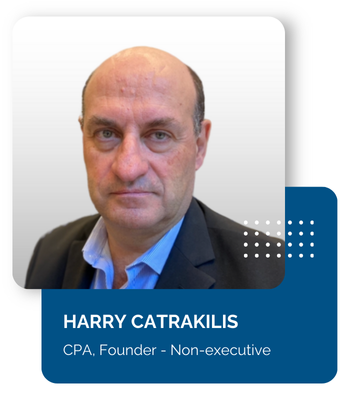Accountability in Accounting: A New CKH Group Blog by Harry Catrakilis
- June 5, 2024
- Posted by: Harry Catrakilis
- Category: Blog

Announcing our new CKH Group Blog
Accountability in Accounting: Our Founder’s Findings by Harry Catrakilis
Welcome to the inaugural blog post of “Accountability in Accounting: Our Founder’s Findings,” penned by Harry Catrakilis, a seasoned CPA and the non-executive founder of CKH Group. In this series, Harry delves into the pressing issues surrounding accounting and audit practices and corporate accountability, drawing upon his extensive experience in the field. Through critical analysis and firsthand insights, Harry seeks to challenge prevailing norms and advocate for greater transparency within the accounting profession.
“With more time in my new role to reflect on the world, and after observing industry practices for some time, I’ve decided to explore the discourse surrounding the value of the accounting profession as seen from the perspective of a typical American business person and not from the large corporate viewpoint that gets prolific exposure. There seems to be a growing skepticism regarding the efficacy of audits and the professional integrity of the industry. The establishment of the PCAOB, for instance, reflects a perceived need for governmental oversight due to lapses in self-regulation.
Furthermore, there is a concerning trend among some corporate leaders who prioritize personal interests over the well-being of their organizations. This behavior often results in decisions that favor short-term gains over long-term sustainability, potentially compromising the interests of stakeholders.
The prevailing sentiment, encapsulated by my statement that “No one ever got fired for picking the Big 4,” highlights the corporate mindset to make decisions that are safe, but not necessarily “right”. While these firms offer a perceived sense of security, their services often come at a premium. In addition, their harsh business environment results in extremely high staff turnover, forcing clients to retrain consultants that rotate on their projects. These actions, high prices and staff turnover, make them less accessible to smaller enterprises. This exclusivity can lead to a misalignment of priorities, where client satisfaction takes a backseat to accommodating the high-profile accounts.
Although this may come across as an outsider’s perspective tinged with frustration, my intention is to shed light on instances where the accounting profession falls short of its responsibilities. I will discuss different topics as they are top of mind. For example, recent cases, such as the collapse of Silicon Valley Bank (SVB), Signature, and First Republic, despite audits conducted by reputable firms like KPMG, underscore the need for greater scrutiny. While audit firms may defend their practices citing adherence to professional standards, there’s a growing chorus of skepticism regarding their efficacy. In my eyes, if the auditor said things were fine and now they are not, what value does this auditor bring to the table?
It’s worth noting that issues extend beyond a single firm, with scandals implicating several major players in the industry. From EY’s involvement in the Wirecard debacle to Deloitte’s audit of Go Ahead, instances of audit failures raise questions about the effectiveness of oversight mechanisms within the profession.
In the coming months, I aim to explore these types of issues further, drawing attention to the nuances of practices within the profession and advocating for greater accountability within the industry. My hope is to encourage informed decision-making among stakeholders and reintroduce the culture of transparency and integrity in audit processes.” -Harry Catrakilis
As we conclude this first installment of “Accountability in Accounting,” it’s evident that the landscape of accounting and audit practices is rife with complexities and challenges. From concerns over the influence of large firms to the need for enhanced oversight mechanisms, the journey toward accountability is multifaceted. Through ongoing discourse and engagement, we hope to contribute to meaningful change within the industry, fostering a culture of integrity and responsibility. Join us in the coming weeks as we continue to explore these vital issues and strive for a more accountable future in accounting.
The above article only intends to provide general information and reflection. It is not designed to provide specific advice or recommendations for any individual. It does not give personalized tax, financial, or other business and professional advice. Before taking any form of action, you should consult a financial professional who understands your particular situation. CKH Group will not be held liable for any harm/errors/claims arising from the blog. Whilst every effort has been taken to ensure the accuracy of the contents, we will not be held accountable for any changes that are beyond our control.
About the Author
Harry Catrakilis has over 30 years of experience in the practice of public accounting, corporate financial management, and investment banking. He was managing partner of CKH from 2003 until summer of 2018 when main operations were passed on to CEO Nico Meyer. This blog was written by and is the candid reflections of Harry Catrakilis.

